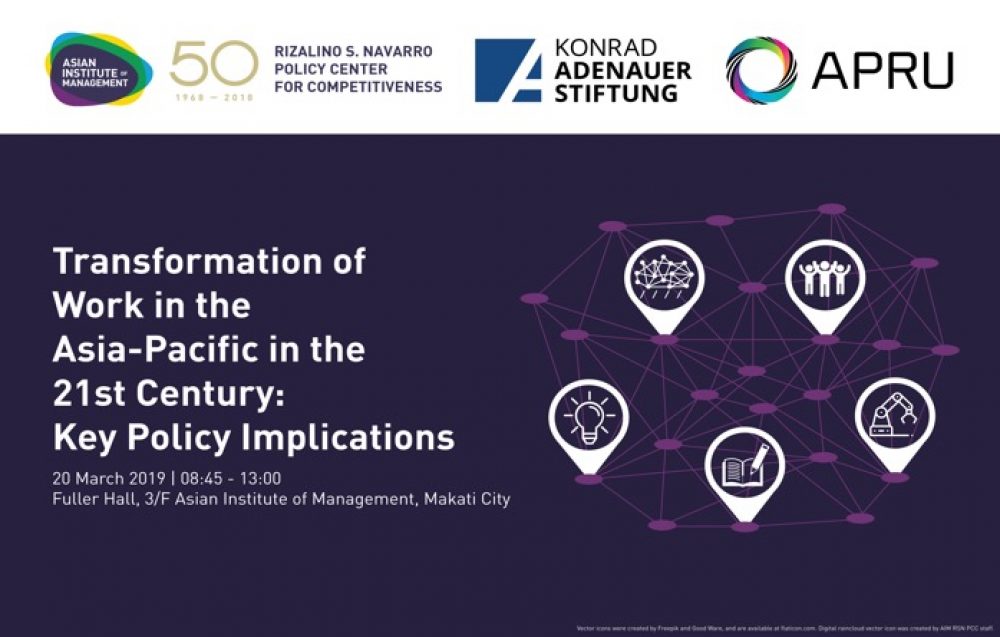Transformation of Work in the Asia-Pacific in the 21st Century: Key Policy Implications/PDF
March 19, 2019-The Asian Institute of Management Rizalino S. Navarro Policy Center for Competitiveness (AIM RSN PCC), in partnership with the Konrad-Adenauer-Stiftung (KAS) Philippines and the Association of Pacific Rim Universities (APRU), held a public forum entitled “Transformation of Work in the Asia-Pacific in the 21st Century: Key Policy Implications” on 20 March 2019 at the Asian Institute of Management, Makati City. The forum was geared towards sharing the results of the ‘Transformation of Work in Asia-Pacific in the 21st Century’ project, a collaboration between AIM and APRU member schools. It also provided a venue for high-level discussion on policy implications for education, competition policy, and business regulation.
The opening remarks from AIM President and Dean Jikyeong Kang set the tone of the event. She discussed how the project came about and the desired outcome of the forum – igniting conversation on education and human capital development in the Fourth Industrial Revolution (4IR). She emphasized, among many recommendations, innovation and training to prepare the future workforce.
Ms. Christina Schönleber, the Policy and Programs Director of the Association of Pacific Rim Universities (APRU) provided an overview of the APRU, their programs and projects, and the Transformation of Work in the Asia Pacific project. It aimed to analyze how the digital future will transform the future of work. The book is composed of six chapters tackling cultural impact, social benefits and challenges in the diverse regional contexts, and policy recommendations.
Dean Kar Yan Tam of the HKUST Business School provided the keynote presentation and focused on the overall findings of the study. The main takeaways are:
- The negative relationship between automation readiness and income inequality, the positive relationship between automation readiness and labor productivity, the positive relationship between automation readiness and economic growth, and the negative relationship between automation readiness and unemployment.
- Some recommendations for education and retraining of the current workforce: (1) promote STEM / STEAM education in primary and secondary schools; (2) ensure adequate supply of talent in technology and engineering; and (3) promote sustainable lifelong learning for the workforce through tax incentives.
Dr. Jamil Paolo Francisco of the AIM RSN PCC presented the implications for the country. In his presentation, Automation and the Future of Work in the Philippines, the main insights and recommendations were the following:
- In the Philippines, the most vulnerable workers are the youth, agricultural workers, less educated, and the low-income;
- In the third industrial revolution, Information and Communications Technology (ICT) was a major enabler for the Philippines;
- Automation should be a matter of how and when;
- Build capacities in Infrastructure, Institutions, and Intelligence;
- Re-equip the workforce and re-invent the economy.
This was followed by a panel discussion participated by Director John Arnold Siena of the National Educators Academy of the Philippines, Commissioner Johannes Bernabe of the Philippine Competition Commission (PCC), Dr. Aniceto Orbeta of the Philippine Institute for Development Studies (PIDS), Executive Director Ahmma Charisma Satumba of the Institute for Labor Studies (ILS), and Executive Director Nicki Agcaoili of the IT and Business Process Association of the Philippines (IBPAP). Dr. Federico Macaranas moderated the panel discussion and the open forum.
Click here to see more photos.

